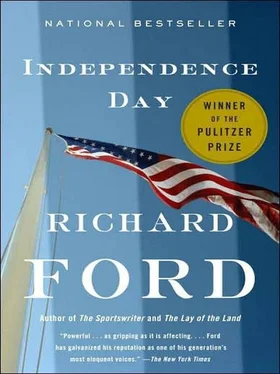Someone says, “Okay? Let us out.”
And then Paul is on his way out, under a blanket, one hand still covering his damaged eye like a war casualty, through the cage door and across the asphalt to the blinking, clicking yellow Life Line ambulance — a Dodge Ram Wagon with antennas, flashers, lights rotating all over.
I watch with Irv as the stretcher is loaded, the doors go closed, both attendants walk around and enter in no great rush. Two more loud bwoop-bwoops sound as their stand-clear, then the engine makes a deep reverberant rumble, lurches into gear, more lights go sharply on, the whole immense machine inches forward, stops, wheels turn, then it is going again, gathering itself, and is quickly gone in the direction of Main without benefit of siren.
Irv-the-solicitous is concerned with how to keep my mind off my woes and so drives us back down Route 28 as slowly as a funeral cortege, trusting to cruise control in his blue renter Seville and talking about whatever would take his mind off his woes and turn anyone like him toward the bright side. He is wearing big rattan sandals which, with his swarthy balding head and gold cardigan over his hairy chest make him look like nothing as much as a Mafia capo out for a drive. Though in truth he’s in the simulator business out in the Valley of the Sun, his particular mission being to design flight simulators where the pilots for all the big airlines learn their business, a skill he acquired along with aeronautical engineering at Cal Tech (though I’m sure I remember him being a Boilermaker).
Irv, however, doesn’t want to get into “six-degree freedom, or any of that,” which he lets me know to be the high and guiding principle of the simulator racket (roll, pitch, yaw, up, side, backward). “It has to do with what your middle ear’s telling you, and it’s all pretty routine.” He’s interested instead in him and me “getting back on track after lo these blows,” which involves telling me unexpectedly what a wonderful woman my mother was and what a “real character” his dad was, too, and how lucky they were to find each other in their waning years, and how his dad had confided to him that my mother always wished she could be closer to me after she remarried, but Irv figured she understood pretty well that I could take care of myself and that I was over in Ann Arbor preparing for a damn good career in whatever walk of life I selected (she might be surprised today), and how he’d tried several times over the years to contact me but had never “gotten through.”
It occurs to me as we’re cruising airily along by the factory sweater outlets and undercoating garages on Route 28, and farther yet past the sugar houses and corn patches and pristine hardwood hillsides rememberable from our trip up yesterday, that Erma, Irv’s lady friend, has somehow disappeared and hasn’t even been mentioned. And indeed she is a palpable loss, since I’m sure Irv would drive faster if she were in the back seat, and they would talk to each other and defer to my particular woes in silence.
Irv, though, starts spieling about Chicago, which he pronounces Shu-caw-guh , telling me he’s giving some thought to moving back there, possibly to Lake Forest (near Wally Caldwell’s relations), since the aircraft industry’s about to take it right in the center hole, in his view. He, along with every other licensed and still-breathing engineer in the world, is a Reagan man, and he’s right now expecting to “go with” Bush, yet feels Americans don’t like indecisiveness, and Bush doesn’t seem much good on that front, only to his mind he’s better than any of the “mental dwarfs” my party’s currently sponsoring. He hasn’t, however, totally ruled out the protest vote or an independent candidate, since the Republicans have sold out the everyday wage earner the way the Nazis sold out “their friends the Czechs.” (He does not strike me as a likely Jackson supporter.)
I basically stay silent, thinking sorrowfully of my son and of this day, both of which seem bitter and bottomless losses with absolutely no hope of recovery. There is no seeming now. All is is . In a better world, Paul would’ve snagged a line drive bare-handed off the bat of one of the ersatz A’s, gone trooping off to the Hall of Fame with a proud, satisfyingly swollen mitt, had a satisfactory but not overly good time nosing around through Babe Ruth’s locker, taking in the Johnny Bench “out at second” video and hearing the canned crowd noises from the Thirties. Later we could’ve walked out into the shimmery sunshine of Sunday, caught-ball in hand, gone for a Gay Nineties malt, found some aspirin, had our caricatures drawn together wearing vintage baseball suits, had some well-earned laughs, played Frisbee, set off my bottle rockets along a deserted inlet of the lake and ended the day early, lying in the grass under a surviving elm, with me explaining the ultimate value of good manners and that a commonsense commitment to progress (while only a Christian fiction) can still be a good, pragmatic overlay onto a life that could get dicey and long. Later on, motoring south, I’d have turned off on a back road and let him practice driving, after which we’d forge a plan, once his legal problems are settled, for his coming down to Haddam for school in the fall. A day, in other words, when the past got pushed further away and neutralized, when a promising course was charted for a future based on the postulate that independence and isolation were not the same, when all concentric rings would’ve snapped down and into place, and a true youthful (barkless, eeeckless) synchronicity might’ve flourished as only in youth it can.
But instead: Remorse. Pain. Reproach. Blindness (or, at the very least, corrective lenses). Gloom. Tedium (involving lengthy, lonely drives up to New Haven and the final failure of progress to mean more than avoidance and denial) — nothing we couldn’t have accomplished by staying home or revisiting the fish elevator. (He’ll never come to live with me now, I’m sure of it.)
Irv, grown mute out of respect or boredom, crests the last hill above I-88, and through the tinted windshield I can see a long, river-sinuous cornfield opening down the narrow valley of the Susquehanna just where the two roadways meet. There a pheasant bursts out of the high green stalks, flashes just above the tassel tops, sets its wings at a fence row and sails halfway across the four-lane and settles into the median-strip grass.
Who or what scared it, I wonder? Is it safe there in the middle? Can it possibly survive?
“You know, Frank, you can get hooked up to too commanding a metaphor in my business,” Irv says, finally sick of being silent and just starting in on whatever he happens to be thinking about as we turn west toward the bricky old town of Oneonta. It is the habit of a man too much alone. I know its symptoms. “Nothing else seems as interesting as simulation when you’re in it. Everything seems simulatable. Except,” he adds, and looks at me for serious emphasis, “the people who do it best are the people who leave their work at the office. Maybe they’re not always the geniuses, but they see simulation as one thing and life as another. It’s just a tool, really.” Irv gives his own tool a little two-finger nudge inside his sweatpants for comfort’s sake. “You get in trouble when you confuse the two.”
“I understand, Irv,” I say. Irv, who has traveled to Cooperstown for one of O’Malley’s Fantasy games tomorrow (with the ’59 White Sox), is, in fact, a good and sweet man. I wish I knew him better.
“You married, Frank?”
“Not these days,” I say, feeling my arms and shoulder joints already stiffening and getting sore, as if I’ d been in an accident or had aged twenty years in an hour. I’m also grinding my teeth and will, I’m sure, lose more precious angstroms of enamel by morning. I point out to Irv the important blue sign with a white “H,” and we begin following its direction down into town, where church is in session everywhere and few cars are on the move.
Читать дальше












